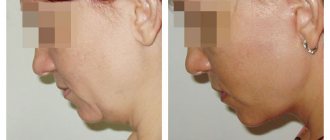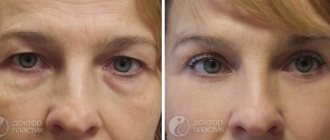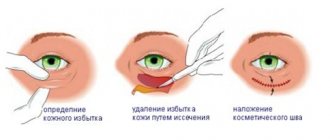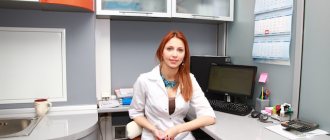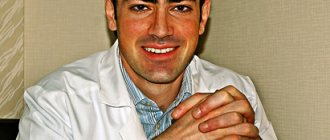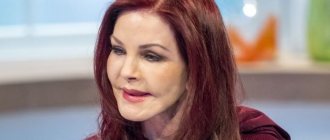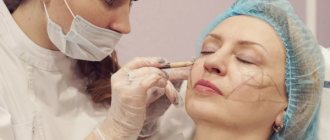Kuzanov Oleg Artemovich, reviews found: 29, work experience: 36 years
List of manipulations and operations:
- ECG interpretation;
- ECG monitoring using Holter;
- 24-hour blood pressure monitoring;
- tests with physical activity;
- Echo-CG;
- study of external respiration function.
- Nosologies treated by the doctor:
- IHD;
- acute coronary syndrome;
- hypertonic disease;
- heart failure;
- cardiomyopathy;
- arrhythmias;
- heart defects in adults;
- myocarditis;
- pericarditis;
- dyslipoproteinemia.
Kuzanov Oleg Artemovich Cardiologist, Anesthesiologist, Reanimatologist
Education
- Diploma in General Medicine (Medicinal and Preventive Medicine), Russian National Research Medical University named after N.I. Pirogov (1986)
- Internship in the specialty "Surgery", Institute of Cardiovascular Surgery named after A.N. Bakulev, cardiac surgery department of the City Clinical Hospital No. 15 named after. O.M. Filatova (1987)
- Internship in Invasive Cardiology, Lenox Hill Heart and Vascular Institute (2010)
- Internship in the specialty “Therapy”, Educational and Scientific Medical Center of the Administration of the President of the Russian Federation, Department of Cardiology and General Therapy (2013)
Refresher courses
“Therapy” “Functional diagnostics”, Internship at Lenox Hill Heart and Vascular Institute, New York, USA “Invasive cardiologist” (2010) “Nephrology”, Educational and Scientific Medical Center of the Administration of the President of the Russian Federation, Department of Therapy, Cardiology and functional diagnostics (2013)
experience
Anesthesiologist-reanimatologist, City Clinical Hospital No. 15 named after. O.M. Filatova, cardiac surgical resuscitation unit (1987-2000) Senior doctor anesthesiologist-resuscitator, JSC Dentistry No. 2 (2000-2006) Head of cardiac surgical resuscitation, Clinic of General Surgery and Emergency Cardiology of the Moscow Medical Academy named after I.M. . Sechenova (2006-2008) Senior anesthesiologist-resuscitator, CJSC Dentistry No. 2 (2008-2011) Cardiologist, CJSC MedLider (2011-2014) Cardiologist, functional diagnostics doctor , Curare-Medicine CJSC (2014-2015) Cardiologist, functional diagnostics doctor, Open Clinic (2015-2017)
Tbilisi week
Almost everyone knows the name of the master of Georgian reconstructive plastic surgery, Ivan (Iva) Egorovich Kuzanov. One can talk endlessly about his recognition, merits, and virtuoso operations. His authority at the global level is undeniable. We wanted to introduce you, dear readers of the Tbilisi Week, to a man, a Tbilisian, to whom every corner of Georgia is dear, his native Italian courtyard on the street. Marjanishvili, his family, friends, grateful patients...
Where does childhood go...
– What was your Tbilisi childhood like?
“Delicious,” Tbilisians like to say when they want to express their admiration. I was born in the 2nd maternity hospital, which was located on Kamo. My brother Koka, my children Egor and Alexander, and four grandchildren were born there. It turns out that this was our family maternity hospital. It’s a pity that this old building with high ceilings was demolished. It's a pity…
My family lived in an Italian courtyard on Marjanishvili Street. Previously, this entire house belonged to my ancestors. But the revolution, Sovietization broke out, and strangers moved into our rooms. Subsequently, my father and uncle did everything to return this house. And now our friendly family has settled in this house, arranged a courtyard, thereby preserving the family heirloom.
I grew up in the same yard with four others the same age. There was only one girl among us - Dodo Kekelidze. When my mother lost her milk, her mother fed Dodo with her breast milk for a month. So, in addition to my brother Koki, I had a foster sister.
– So many kids in one yard, wasn’t it noisy?
- We lived cheerfully and amicably. If they quarreled, they quickly made up. The main thing is to be able to forgive. And it worked out well for me. We were escorted to school, to first grade, by the entire yard. Fortunately, it was not far to walk, because school No. 20 was located next to our house.
– What kind of student was Iva Kuzanov?
– I was an average student. It happened, and I got a bad grade. I especially did not like the exact sciences. I remember I had a geometry exam coming up, and I had to turn to my school teacher for help. He was strict and somewhat stern. I remember coming to him and knocking on the door. He didn’t open it for a long time, then he let me in, sat me down at the table and started chasing tickets. Suddenly there was a knock on the door. The mathematician told me to hide behind the curtain. When I got there, I saw three of my classmates, poor fellows like me. At that time, tutoring was not encouraged, so our teacher secretly prepared us for final exams...
– And yet, what subject did you prefer?
- Of course, biology. I was going to become a doctor, like my dad. When sons follow their father, the dynasty does not end. My father, Egor Ivanovich Kuzanov, was a famous surgeon who taught at the Tbilisi Medical Institute. He gave many young general and vascular surgeons a start in life, as they say, put them on the wing. Mom, Eleonora Nikolaevna, was a pediatrician. So the dynasty of the Kuzanov doctors did not end.
– As I understand, you and your brother attended the same school. Which of you was more cocky and rude?
- Perhaps Koka. Subsequently, he became a famous documentary film director. Unfortunately, he passed away two years ago. But in my memory he remained the same merry fellow and ringleader. I remember in the 6th or 7th grade he encouraged a classmate to dress up as a girl. We dressed the boy in black tights, a short dress, a wig, put on makeup and began running around the school with this “girl.” And at this time there was renovation going on. The workers chased after her, we rushed to fight her off... The director intervened. I found out that Koka had organized everything and called my father to school. Everyone respected Yegor Ivanovich very much, and we, of course, were afraid of dad. He came to the director, and when they began to complain to him about his brother, his father asked him to prepare documents: “I’ll send Koka to a boarding school.” God, what happened, not only with us, but the whole school began to beg Yegor Ivanovich not to do this. Of course, Koka stayed in school.
– What else do you remember about studying?
– The internship we had at the woodworking factory in Didube. We got there by tram, did not ride in a carriage, but clung to the ledge of the cabin of the last carriage and so dashingly got to work. With a risk to life, but with a breeze.
And yet, at school I met my destiny, my beloved and beloved Allochka. We studied with her from the first grade, and closer to graduation our friendship grew into love. And for almost 50 years now she has been my wife, faithful, devoted, loving, understanding and forgiving of everything.
“I will become a surgeon, like my father”
– You mentioned that while still in school you decided to become a surgeon and were preparing to enter medical school.
– Indeed, I decided to enter the medical institute, but not the Tbilisi one. The competition for our university was crazy, so my father and I decided that I would go to Makhachkala Medical Center, and after the first session I would transfer to Tbilisi. So during my studies I became a resident of the Dagestan capital. At that time, in Dagestan, playing KVN was a novelty, and I already had some experience. Then in our universities there were funny “battles” of resourceful people, and these competitions were shown on TV, and at school we played KVN with passion. So in Makhachkala honey I gathered a team of cheerful and resourceful people, led it and became “the first guy in the village.”
– Did your team perform successfully?
– Of course, because I had experience, enthusiasm, and most importantly, I managed to “infect” my doctors with this game. I remember our team fought with KVN players from Makhachkala State University. The chairman of the jury was our biology teacher. We all called him Crocodile. He was very strict, especially towards me. I portrayed him in one of the pantomimes. Well, I think Iva has disappeared, you won’t see the score like your ears. Surprisingly, he reacted to my performance in the KVN style and did not cut me off in the exam. In that jury, I first saw the Dagestan poet Rasul Gamzatov. A week later he ended up in the cardiology department of one of the city clinics. The rector of our institute, Maksudov, decided to appoint me and a couple of my fellow students to guard the poet’s chamber so that no one would disturb him.
Everything happened while I was on duty. It was already 9 o’clock in the evening when two black Volgas drove up to the hospital, and respectable Avars in hats got out of them, with baskets full of wine and fruit. I tried to block their way and begged them not to bother Rasul. But Gamzatov himself left the room and ordered the guests to be let through. Until three o'clock in the morning they drank cognac, Rasul read his poems. The next day, when I came to class, I saw on the notice board an order for my expulsion. The reason was that I did not follow the rector’s instructions and allowed guests to visit Rasul Gamzatov.
– And you returned to Tbilisi?
- Not at all. I went with this order to Gamzatov, he immediately called the rector and settled everything. The order was canceled and I continued my studies.
Return to native land
– After successfully passing the first session, I transferred from the Makhachkala Medical Institute to Tbilisi. Not only my relatives, but also Alla were waiting for me at home.
– And you decided to get married?
- Why put it off? I was 21 years old, I had already entered the 2nd year. The wedding was celebrated by the whole yard. Father invited his friends - the ensemble of zurnachs “Ksovreli” and film actress Marina Tbileli. Tamadil is my father’s close friend, the chief physician of the 2nd Abashidze City Hospital. It was a lot of fun. The zurnachi played, Marina read poetry... Then the Kinto came, brought a tray of tsotskhali, and then released two pigeons into the sky for luck. It was December, but the day turned out to be warm and sunny...
– So, apparently, your life with Alla Eduardovna turned out warm and sunny...
– She’s just a miracle to me! Due to my busy work, I don’t pamper her with attention very often, but in the spring, when the lilacs bloom, I make sure to buy the most luxurious bouquets for her. These are her favorite flowers.
Already in my second year, I began to work in parallel with my studies as an orderly at my father’s clinic. And only in my fourth year I was transferred to the position of nurse.
– When did your first operation take place?
– When I was in my third year, I had night duty. My father’s friend, surgeon Nodar Darchia, gave me the opportunity to perform apedictamy. Everything went well, but when my father found out about it, he was very angry. I had tried to help dad during operations before, but he would hit me on the hands with an instrument if I did something wrong. His colleagues said that this should not be done, saying that the guy could leave surgery. But, as you can see, I didn't leave. And already in the fourth year he successfully performed gastric resection surgery. In addition to my father, I had wonderful teachers: Egnate Pipia, Mikhail Chachava and others. So there was someone to gain experience from.
Twist of fate
– When I was already in my fifth year, I, together with my classmate Merab Dvali, was lucky enough to attend the World Congress of Surgeons in Moscow. The section on gastric surgery was headed by Egnate Pipia, who collected the largest scientific material in the world. We were able to communicate with leading surgeons from America, England, and Russia. This became an excellent school for us – future surgeons.
– And how did the further development of surgeon Iva Kuzanov happen?
– After graduating from the institute, by order of the Minister of Health of Georgia, all medical graduates had to work for two years in the periphery and only then had the right to further study in graduate school or residency. But fate turned out to be favorable to me. At that time, a large delegation of surgeons arrived from Russia to Georgia... My friend Merab Dvali and I were lucky enough to accompany the famous vascular surgeon DeBakey. He is Arab, but lived and worked in America. Mr. DeBakey really liked us and at a banquet in the Lycan Palace he raised a toast to the young talents - me and Merab - and said that he would take us to America and make us famous vascular surgeons. Immediately, the head of the Moscow delegation, Academician Eduard Vantsyan, stood up and declared that we could not send these talents overseas, but would take them to Moscow.
- So, did he keep his promise?
– Yes, so Merab and I continued our studies in Moscow. I am in the general surgery clinic, and he is in the ophthalmology clinic. But soon I received an offer from Professor Viktor Solomonovich Krylov from the Moscow Institute of Surgery of the Academy of Medical Sciences to study vascular microsurgery.
– And how did you react to this?
– Microsurgery was still developing at that time and I didn’t really know all the subtleties of the manipulations being performed. Having seen two professors bending over a rat, sewing the abdominal aorta under a microscope, I became eager to see it closer. I went up to the eyepiece of the microscope, saw the thread that was used to sew the aorta, and I felt that it was mine!
At that time, Professor Krylov gathered a group of young doctors for further training in microsurgery, among whom were the now famous professors Tristan Peradze and Renat Akchurin. This is how a group of founders of vascular microsurgery in the Soviet Union was formed.
Our team of surgeons did a tremendous amount of work until we achieved the desired results, developed methods of conducting surgery to restore damaged limbs, and much more related to microsurgery.
Home, and only home
– After defending your PhD thesis, you were offered to stay in Moscow and head the surgical department. But you decided to return to Tbilisi. Why?
– This is the city of my childhood, youth, first love, the city of my ancestors. Tbilisi is sadness and happiness, love and trembling in the heart, and tears in the throat, and everything that I have always associated with the concept of strong feelings - that is, life. And you can’t explain why. Every time I return from a business trip abroad and rush home from the airport, then, going down from Avlabar to the Baratashvili Bridge, I see Tbilisi and such a delight comes over me that it makes my heart skip a beat!
Life as it is
– I notice that lately people are only interested in sitting in front of the TV...
– This is not interest, but laziness. I understand interest as a door to creativity, as an impulse to inspiration, as an unquenchable thirst...
– How to develop this thirst in yourself?
– Read, communicate with interesting people, travel. By the way, I am fond of afrode and have traveled all over Georgia in a jeep. We have such rich nature, so many still unknown ancient monuments, that every time I personally come into contact with the beauties of my native land, I never cease to admire them. Truly Georgia is a holy land given to us by God.
– While talking with you, I was literally captivated by your sincerity. What sincerity is is clear. What is talent?
– This is when, while working, you are overcome with bright and joyful energy. Then this energy is transferred to those who are close to you. If a surgeon is not talented, but only hardworking, he is a craftsman who works automatically. Craftsmanship is not acceptable in plastic surgery. What is needed here are talented, purposeful people, aimed at finding new ways and approaches to a particular operation. Here you have to constantly think, take risks... And, as they say, those who don’t take risks don’t drink champagne!
– And often do you raise a glass of sparkling wine?
– Quite rarely, on holidays and family celebrations. And then I only allow myself to relax on Saturday, since I must have a gap of at least two days before the next operating day. The surgeon's hands are his instrument, which must work accurately. After all, microsurgery is similar to the work of a jeweler, where any, even minor, mistake can lead to irreversible processes. Fortunately, I did not have any such incidents.
- How is your health?
- Wonderful! I get up at 6 am and do my morning 6 km exercise. And also, you see, I know the secret of life and optimism: you have to believe that the best is yet to come.
– Do you consider yourself a happy person?
- I live an interesting life. This, however, does not mean that I have to solve a lot of problems every day, sometimes very difficult, but this is life...
– While talking with you, I remembered a parable: God blinded a man and he still had a piece of clay left. “What else do you need to make, man?” - God asked. “Make me happy!” - he answered. God thought and threw this piece of clay to the man...
- Simple story. Sometimes we forget that everything is in our hands. The main thing is not to get tired, improving yourself. It turns out that a person’s happiness is in our hands. And yet, my happiness is my family, my sons Egor and Alexander, who have taken their rightful place in microsurgery. Sometimes I learn something from them. But at the same time, I am an incentive for them. In relation to each other, we are internal opponents. This is our Cusanian trait. I hope that my four grandchildren will continue the Kuzanov medical dynasty. After all, everything is in our hands.
Natalia GLAZOVA
Comments
Make an appointment with Oleg Artemovich Kuzanov
Diseases of the heart and blood vessels are a fairly serious problem of our time, bringing many unpleasant symptoms and difficulties. Also, if not treated promptly, they can lead to serious life-threatening complications. Doctor Oleg Artemovich Kuzanov will help diagnose and identify the cause of the development of heart and vascular diseases. Only a professional will be able to select the necessary set of treatment measures, taking into account the individual characteristics of each patient, which will allow achieving long-term remission. GlavVrach professionals indicate current information about the doctor’s appointment schedule and the cost of services. You can also read patient reviews and verify the professionalism of Oleg Artemovich Kuzanov. Our specialists provide only current information about doctors in Moscow. Making an appointment with a doctor online is easy and will save your time. Use our service and you will not regret it.
